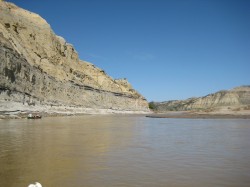Last Word | June 28th, 2017

The river lost most of its scenic protection in June, when Gov. Doug Burgum reversed course and joined the members of his State Water Commission in opening the entire river to industrial water development.
In May, Burgum declared upstream areas of the state’s only official State Scenic River—the areas surrounding the three units of Theodore Roosevelt National Park—off limits to industrial water use, and told State Engineer Garland Erbele to “immediately review, modify and make transparent the process and requirements for any future issuance of temporary use permits for non-agricultural uses.” Read: Permits for fracking water.
That came after it was revealed that the Water Commission staff had issued more than 600 illegal industrial water permits, and then had state law changed in the waning days of the 2017 Legislature to make such permits legal.
The Little Missouri State Scenic River Act, passed by the 1975 Legislature, prohibited the use of Little Missouri water for industrial purposes. The bill passed this year changed that. Friends of the river urged Burgum to veto the legislation, but he declined, instead issuing his policy of only allowing those permits downstream of the National Park.
In issuing that policy, Burgum said in a letter to me and others “As governor, a North Dakota resident and a property owner on the Little Missouri River, protecting our environment and being responsible stewards of our natural resources is a priority for me personally and for our administration.”
Well, so much for “being responsible stewards.” The action by the Water Commission took care of that. Erbele did his “review” and came up with a recommendation 180 degrees from Burgum’s policy, opening up the entire Little Missouri State Scenic River basin to industrial use.
And in a puzzling move, the Governor then took that recommendation to the Water Commission, instead of acting on it himself, as he had done in declaring his earlier policy.
Even more puzzling, the Governor did not question the policy recommendation, and voted to implement it, opening up the entire river to industrial development and leaving friends of the river shaking their heads in wonder—and anger—at his inconsistency.
Now, I suspect that the Governor, if questioned, would say he wanted broader input on the policy—input from his State Water Commission members. But the Water Commission only heard one side of the story—the oil industry’s side—at its June meeting. Opponents of the policy, who wanted to keep industrial development away from our State Scenic River and from the National Park, were not given a chance to speak to the issue.
Several of those opponents sat through the marathon session for five hours, waiting for a discussion of the Little Missouri State Scenic River Act, as promised on the Commission’s agenda. But they were caught off guard when a Water Commission staff member presented a recommendation from a list of four options—the three which were not adopted offered some protection for the river—and the Commission adopted the one opening up the river for development after a brief discussion.
Only Agriculture Commissioner Douglas Goehring’s stand-in at the meeting voted against the recommendation, citing concerns over industrial use trumping the needs of farmers and ranchers for irrigation.
One of those at the meeting, Jan Swenson, executive director of Badlands Conservation Alliance and a constant watchdog over the Little Missouri, wrote to her members after the meeting “It is my estimation the original authors of the Little Missouri State Scenic River Act would be stunned. While potential coal gasification plants may have been the issue at hand then that prompted the Act, I think they would have been equally concerned about the potential for industrialization of the Little Missouri River Valley by current Bakken development.”
I was among those who thought it unusual for a major new state policy to be adopted by an important state agency without any public discussion or any chance for making a case against the policy before a vote was taken. But then, if we can adopt a national health care policy written behind closed doors, I suppose nothing surprises any more.
There was some discussion among Commission members before the vote. Commissioner Harley Swenson (no relation to Jan) of Bismarck questioned the urgency of adopting the policy, given low water levels in the Little Missouri this year, and pointing out that there were another 1,000 wells awaiting fracking right now, and perhaps wells along the river could wait until there is more water available and the list of wells awaiting fracking shrinks.
But Commissioner Larry Hanson, also of Bismarck, jumped in on behalf of the oil industry, saying that if they don’t get the water out of the Little Missouri, it’s a “long haul” to have it brought in from somewhere else. Old, white-haired, mostly bald heads around the table nodded in assent, and a vote was taken quickly then to approve the policy.
I point out the white-haired, mostly bald heads because the Water Commission is—or should be—an embarrassment to North Dakota government. All seven appointees to the board are old white males, many well into their 70s, at least one 80. To be fair, all were appointed by governors other than Burgum, and Burgum let four of them go after the June meeting, opening up their spots to new members he will appoint later this summer. Maybe some women? Maybe some under 70?
So what’s next? Right now, the Water Commission staff said yesterday, there are four industrial water permit applications pending, asking for water for oil well fracking from the Little Missouri. I looked them up on the Water Commission’s website. All are between the North and South Units of the National Park, one just a couple miles from the Elkhorn Ranch. One has asked to start pumping water immediately, one on September 1, and two on November 1. The permits, once approved, are good for only twelve months, so I’d guess they will be pretty eager to get going.
The oil companies have negotiated what I suspect is a pretty sizeable fee with the ranchers for access to the river on their land, and building some kind of water depot into which they’ll pump the water. And then the water trucks—as many as a thousand trucks for each well—will thunder down the hill to the depot and load up and take their water to the well that needs fracking. At least I think that is how it works.
I asked the Water Commission after the meeting what their intentions are for those four permit applications. Here’s the response:
“They all are in pending status. Based on the decision of the State Water Commission yesterday, they are eligible to be reviewed for approval. If approved, conditions will be applied similar to the temporary industrial permits that have been issued downstream of the Long-X bridge. A threshold and maximum pumping rate will be developed for this reach of the river based on the Medora gage.”
Well, I don’t suppose they’ll be pumping much water from the river right now if they are approved–which they could be. This summer the river is experiencing record low flows, some days almost coming to a dead stop. But if it rains . . .
April 18th 2024
April 18th 2024
March 21st 2024
September 23rd 2023
August 20th 2023


__293px-wide.jpg)


